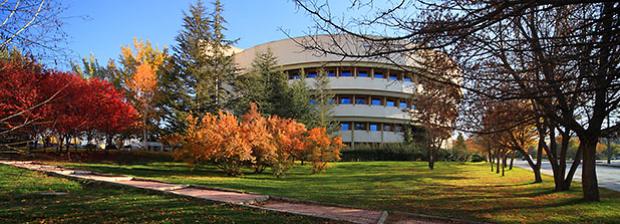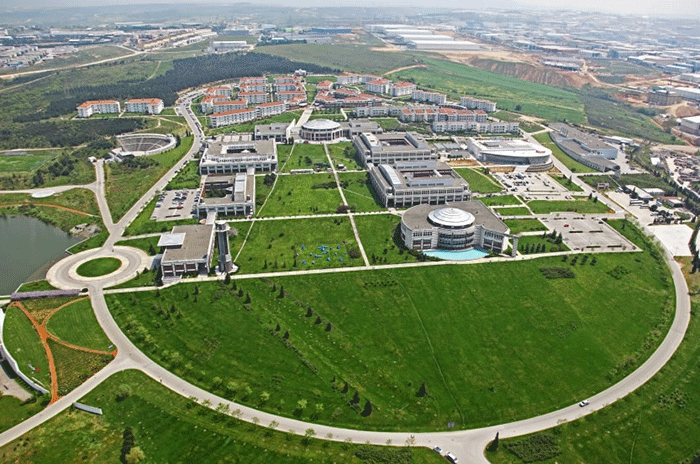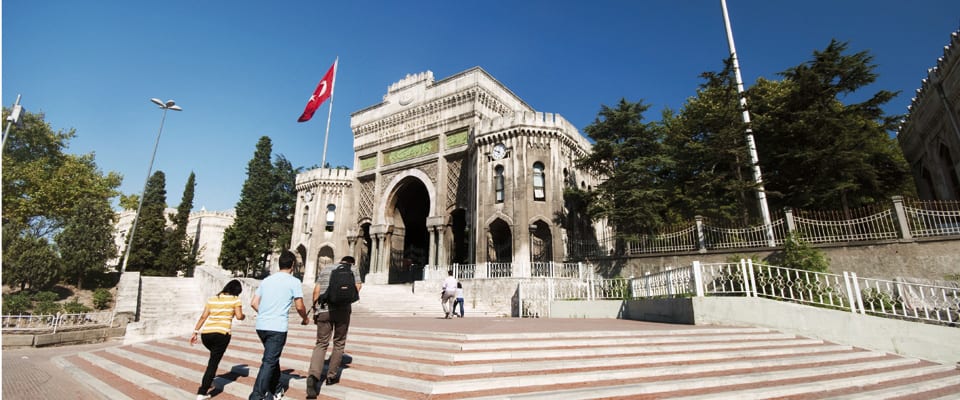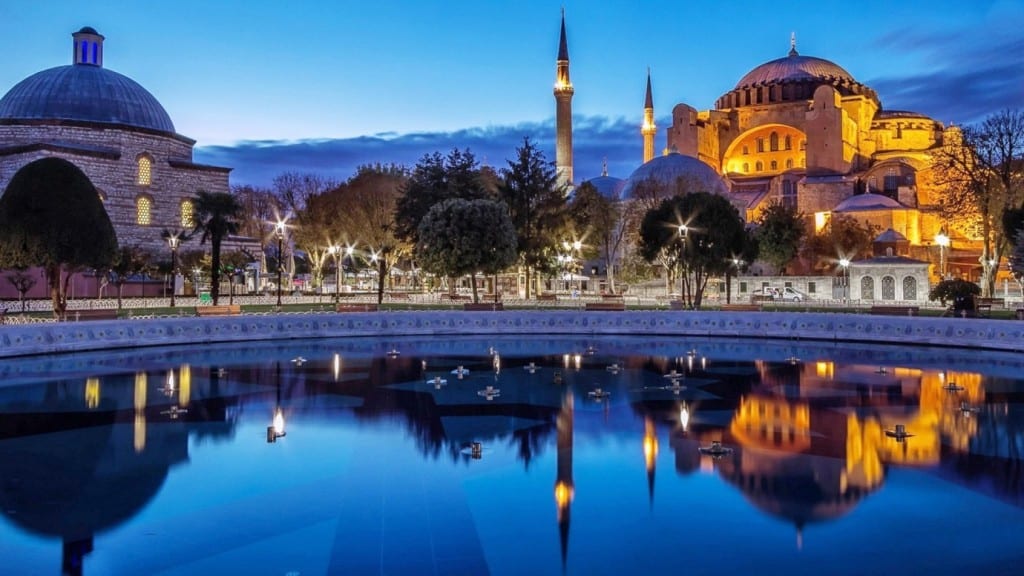Straddling the continents of Europe and Asia, Turkey’s strategically important location has given it major influence in the region – and control over the entrance to the Black Sea. Turkey is bordered by eight countries: Bulgaria to the northwest; Greece to the west; Georgia to the northeast; Armenia, Iran and the Azerbaijani exclave of Nakhchivan to the east; and Iraq and Syria to the south. The Mediterranean Sea is to the south; the Aegean Sea to the west; and the Black Sea to the north. The Sea of Marmara, the Bosphorus and the Dardanelles (which together form the Turkish Straits) demarcate the boundary between Thrace and Anatolia; they also separate Europe and Asia.
Turkey is a democratic, secular, unitary, constitutional republic with a diverse cultural heritage. The country’s official language is Turkish, a Turkic language spoken natively by approximately 85 percent of the population. 70–80 percent of the population are ethnic Turks; the remainder consists of legally recognized (Armenians, Greeks and Jews) and unrecognized (Kurds, Circassians, Albanians, Bosniaks, Georgians, etc.) minorities The vast majority of the population is Muslim. Turkey is a member of the UN, NATO, OECD, OSCE, OIC and the G-20. After becoming one of the first members of the Council of Europe in 1949, Turkey became an associate member of the EEC in 1963, joined the EU Customs Union in 1995 and started full membership negotiations with the European Union in 2005. Turkey’s growing economy and diplomatic initiatives have led to its recognition as a regional power.
The coastal areas of Turkey bordering the Aegean and Mediterranean Seas have a temperate Mediterranean climate, with hot, dry summers and mild to cool, wet winters. The coastal areas bordering the Black Sea have a temperate Oceanic climate with warm, wet summers and cool to cold, wet winters. The coastal areas bordering the Sea of Marmara, which connects the Aegean Sea and the Black Sea, have a transitional climate between a temperate Mediterranean climate and a temperate Oceanic climate with warm to hot, moderately dry summers and cool to cold, wet winters. Snow falls on the coastal areas of the Sea of Marmara and the Black Sea almost every winter, but usually melts in no more than a few days. However snow is rare in the coastal areas of the Aegean Sea and very rare in the coastal areas of the Mediterranean Sea. Mountains close to the coast prevent Mediterranean influences from extending inland, giving the central Anatolian plateau of the interior of Turkey a continental climate with sharply contrasting seasons.
Winters on the eastern part of the plateau are especially severe. Temperatures of −30 to −40 °C (−22 to −40 °F) can occur in eastern Anatolia. Snow may remain at least 120 days of the year. In the west, winter temperatures average below 1 °C (34 °F). Summers are hot and dry, with temperatures often above 30 °C (86 °F) in the day. The driest regions are the Konya plain and the Malatya plain, where annual rainfall is often less than 300 millimetres (12 in). May is generally the wettest month, whereas July and August are the driest.
Educations
The Ministry of National Education is responsible for pre-tertiary education. This is compulsory and lasts twelve years: four years each of primary school, middle school and high school. Less than half of 25-34 year old Turks have completed at least high school, compared with an OECD average of over 80 percent. Basic education in Turkey is considered to lag behind other OECD countries, with significant differences between high and low performers. There were several universities if you interested to study in Turkey:
-
Bilkent University

Bilkent University is recognized and ranked internationally as the premier institution of higher education in Turkey. Located in the country’s capital city Ankara, a vibrant metropolis of 4.5 million, Bilkent is a hub of academic, social, and cultural activity. With world-renowned scholars among its faculty and top-notch facilities throughout its campus, Bilkent attracts the brightest students. The University hosts 13,000 students seeking degrees in 32 undergraduate and 47 graduate programs. Over 40% of Bilkent University’s student body benefits from a variety of generous scholarships.
International faculty members make up more than a quarter of all academic staff and represent 40 different countries. There is also a growing body of full-time international students, as well as exchange students visiting from more than 200 partner institutions worldwide. Bilkent University is proud to provide an environment for learning and intellectual growth encompassing the sciences, technology and humanities, and will surely continue to rank amongst the finest universities in the world. -
Sabancı üniversitesi
 Under the direction of one of Turkey’s leading family-run foundations, the Sabancı Foundation, the Sabancı Group established Sabancı University in July 1994. More than fifty academicians from 22 different countries, students, and individuals from the private sector participated in the conference in August 1995. At the end of the conference, based on the knowledge and experience of the participants, the key philosophy of a “world university” emerged: “creating and developing together.” This conference was followed by design committees which worked under the guidance of a “Student Tendency Survey” and other academic program design activities.
Under the direction of one of Turkey’s leading family-run foundations, the Sabancı Foundation, the Sabancı Group established Sabancı University in July 1994. More than fifty academicians from 22 different countries, students, and individuals from the private sector participated in the conference in August 1995. At the end of the conference, based on the knowledge and experience of the participants, the key philosophy of a “world university” emerged: “creating and developing together.” This conference was followed by design committees which worked under the guidance of a “Student Tendency Survey” and other academic program design activities.
The groundbreaking ceremony for the Sabancı University campus took place on July 31, 1997. The University began its first academic year on October 20, 1999. With these universal principles in mind, the Board of Trustees, faculty and administration of Sabancı University jointly take responsibility for assuring fullest protection of freedom of inquiry, thought, and expression.With their vision ‘We will be an innovative institution responsive to the needs of all our constituents through a participatory culture that embraces diversity and freedoms. We will have an interdisciplinary educational infrastructure that will create and disseminate knowledge. Sabancı University aspires to become an international reference point for innovation in education and research.’, they always develop internationally competent and confident individuals, enriched with the ability to reflect critically and independently, combined with a strong sense of social responsibility.
-
Bilkent University

One of the main characteristics of Istanbul University is its leadership in higher education for centuries. It has played a guiding and influential role in the social and cultural life of our country. We can clearly see this when we trace the line of historical development of the University. Istanbul University, as one of the oldest educational institutions, not only of Turkey, but also of the world, was founded when Mehmet the Conqueror conquered Istanbul. Education began to be available in theological schools (“medrese/madrasah” as they were then called) and, until the end of the 16th century, these schools were instrumental in educating the ruling cadres of the Ottoman society.With their motto ‘The Science Bridge From History to the Future’, Istanbul University plays role to brings together the East and the West; the past and the future; also it is the leading University raising competent individuals who produce beneficial knowledge for our country and humanity.

